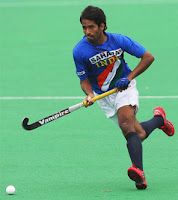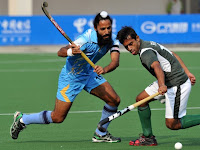National Game of India
The National Games of India is a sporting event held in India. It comprises various disciplines in which sportsmen from the different states of India participate against each other. It was in 1924, in erstwhile Punjab, that the Indian chapter of the Olympic movement was born. The founder was G.D. Sondhi, the first Secretary of the Punjab Olympic Association. Lt.Col H.L.O. Garrett, vice principal of Government College, Lahore, was the President of the founder body. The same year, the country's first Olympic Games, now christened as National Games, were organised in Lahore, the then capital of undivided Punjab.Hockey is the National Game of India.A game played on turf in which two opposing teams of players, using curved sticks, try to drive a ball into the opponents' goal. It is similar to ice-hockey, but no violence and is played on a turf rather than on ice. Hockey has been played in India for time immemorial. There was a golden period of Indian hockey when hockey stalwarts of India ruled the game. On the international scenario there were no competitors to match the magical hands of Indian hockey players. The might and power of Indian hockey made India synonymous with the game. The ball-juggling feats of players like Major Dhyanchand made people to think that Indian players used some kind of black magic.
Indian hockey's golden period was from 1928-56, when the Indian hockey team won six successive Olympic gold medals. Team also won the 1975 World Cup besides two more medals (silver and a bronze). The Indian Hockey Federation (External website that opens in a new window) gained global affiliation in 1927 and joined the International Hockey Federation (FIH).
Hockey was chosen as the National Game because of the team's unparalleled distinction and matchless talent at the time.During the Golden Era, India played 24 Olympic matches, won all 24, scored 178 goals (at an average of 7.43 goals per match) and conceded only 7 goals. The two other gold medals for India came in the 1964 Tokyo Olympics and the 1980 Moscow Olympics.




No comments:
Post a Comment